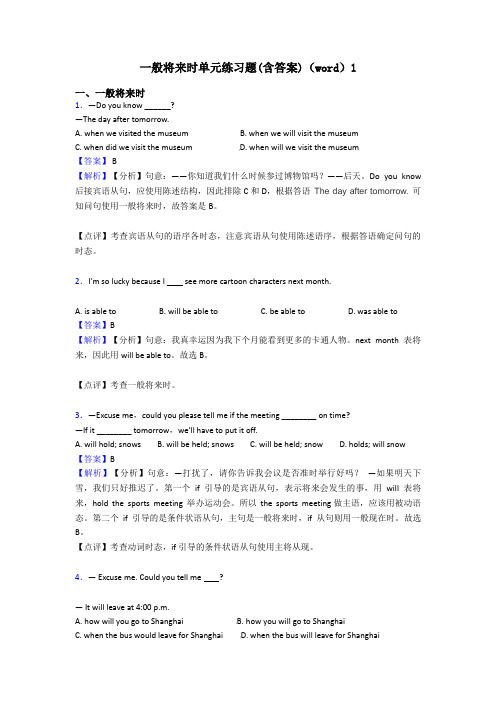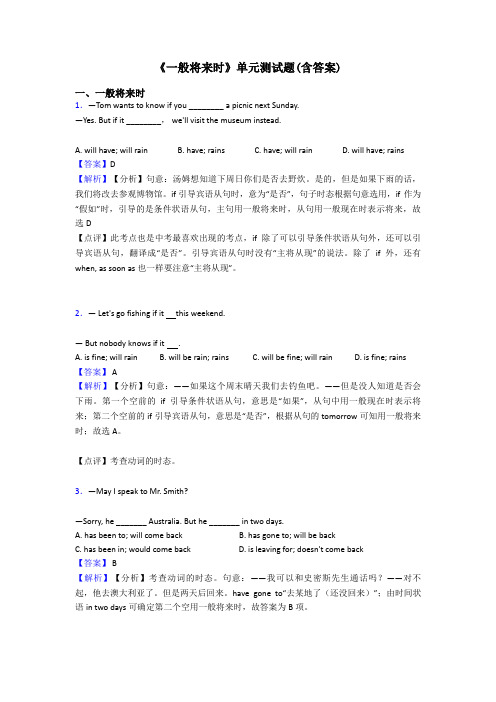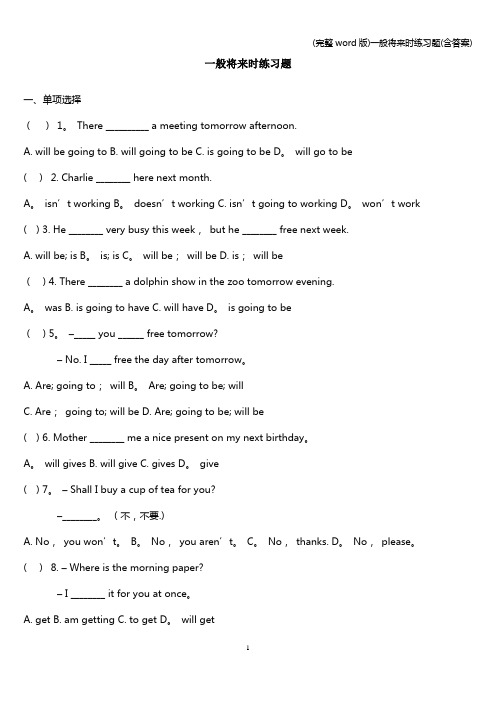【英语】 一般将来时单元测试(word版附答案)
(完整word版)一般将来时习题

一般现在时,现在进行时,一般过去时,一般将来时练习题一.单项选择( )1. Charlie ________ here next month。
A. isn’t working B。
doesn't working C。
isn't going to working D。
won’t work ( )2。
– When ________ again?——When he ____________, I’ll let you know。
A. he comes ;comesB. will he come; will comeC. he comes ;will he comeD. will he come; comes( )3. Do you think Tom ______________ his uncle if he arrives?A。
called B。
calls C。
will call D. is calling()7。
We ________ begin our lessons if you _________ all right。
A. will ; will be B。
shall ; Will get C。
will ; get D. /; are( )9。
Your shirt is not clean。
________ it for you?A。
Am I going to wash B。
Will I wash C。
Am I washing D. Shall I wash()10. Look at these clouds, it _______________. A. will be raining B。
is going to rain C. rains D。
is to rain( )11。
()12. If you don’t mind, I __________ off the TV set.A. will turn B。
一般将来时单元练习题(含答案)(word)1

一般将来时单元练习题(含答案)(word)1一、一般将来时1.—Do you know ______?—The day after tomorrow.A. when we visited the museumB. when we will visit the museumC. when did we visit the museumD. when will we visit the museum【答案】 B【解析】【分析】句意:——你知道我们什么时候参过博物馆吗?——后天。
Do you know 后接宾语从句,应使用陈述结构,因此排除C和D,根据答语The day after tomorrow.可知问句使用一般将来时,故答案是B。
【点评】考查宾语从句的语序各时态,注意宾语从句使用陈述语序,根据答语确定问句的时态。
2.I’m so lucky because I see more cartoon characters next month.A. is able toB. will be able toC. be able toD. was able to【答案】B【解析】【分析】句意:我真幸运因为我下个月能看到更多的卡通人物。
next month表将来,因此用will be able to。
故选B。
【点评】考查一般将来时。
3.—Excuse me,could you please tell me if the meeting ________ on time?—If it ________ tomorrow,we'll have to put it off.A. will hold; snowsB. will be held; snowsC. will be held; snowD. holds; will snow 【答案】B【解析】【分析】句意:—打扰了,请你告诉我会议是否准时举行好吗?—如果明天下雪,我们只好推迟了。
【英语】 一般将来时测试题及答案(word)

【英语】一般将来时测试题及答案(word)一、一般将来时1.- Do you have any plans for tonight?- Yes, I at the new Italian restaurant in town.A. eatB. have eatenC. ateD. am going to eat【答案】 D【解析】【分析】句意:——你今晚有什么计划吗? ——是的, 我打算在镇上新开的意大利饭馆吃饭。
根据句中的时间词“tonight”判断此句应是一般将来时, 结构:am/is/are+ going to do; will do.故直接选D即可。
【点评】一般将来时2.I don't know whether mom _________ me to Beijing next week.A. takeB. takesC. will takeD. would take【答案】 C【解析】【分析】句意:我不知道妈妈下周是否会带我去北京。
分析句子结构可知,此处是宾语从句,主句时态为一般现在时,从句时态根据主现从任原则,再根据从句中的next week可知,从句应该是表示将来的动作,所以用一般将来时,用will do形式,故选C。
【点评】考查宾语从句时态。
注意宾语从句时态的主现从任原则。
3.—Do you know when Mrs. White for dinner this evening?—No, but I think she when she is free.A. will come; will comeB. will come; comesC. comes; will come【答案】 A【解析】【分析】句意:——你知道怀特太太今晚是否来吃晚饭吗?——不知道。
但我认为如果她有空,她会来。
空一,句子为含有宾语从句的主从复合句,主句是一般现在时,从句用它所需要的任何时态,根据this evening今晚,可知句子为一般将来时,will come;空二,回答是when引导的时间状语从句,从句是一般现在时,主句应用将来时,will come,故选A。
《一般将来时》单元测试题(含答案)

《一般将来时》单元测试题(含答案)一、一般将来时1.—Tom wants to know if you ________ a picnic next Sunday.—Yes. But if it ________, we'll visit the museum instead.A. will have; will rainB. have; rainsC. have; will rainD. will have; rains 【答案】D【解析】【分析】句意:汤姆想知道下周日你们是否去野炊。
是的,但是如果下雨的话,我们将改去参观博物馆。
if引导宾语从句时,意为“是否”,句子时态根据句意选用,if 作为“假如”时,引导的是条件状语从句,主句用一般将来时,从句用一般现在时表示将来,故选D【点评】此考点也是中考最喜欢出现的考点,if除了可以引导条件状语从句外,还可以引导宾语从句,翻译成“是否”。
引导宾语从句时没有“主将从现”的说法。
除了if外,还有when, as soon as也一样要注意“主将从现”。
2.— Let's go fishing if it this weekend.— But nobody knows if it .A. is fine; will rainB. will be rain; rainsC. will be fine; will rainD. is fine; rains 【答案】 A【解析】【分析】句意:——如果这个周末晴天我们去钓鱼吧。
——但是没人知道是否会下雨。
第一个空前的if引导条件状语从句,意思是“如果”,从句中用一般现在时表示将来;第二个空前的if引导宾语从句,意思是“是否”,根据从句的tomorrow可知用一般将来时;故选A。
【点评】考查动词的时态。
3.—May I speak to Mr. Smith?—Sorry, he _______ Australia. But he _______ in two days.A. has been to; will come backB. has gone to; will be backC. has been in; would come backD. is leaving for; doesn't come back【答案】 B【解析】【分析】考查动词的时态。
(完整word版)一般将来时练习题(含答案)

一般将来时练习题一、单项选择()1。
There __________ a meeting tomorrow afternoon.A. will be going toB. will going to beC. is going to be D。
will go to be( )2. Charlie ________ here next month.A。
isn’t working B。
doesn’t working C. isn’t going to working D。
won’t work ( ) 3. He ________ very busy this week,but he ________ free next week.A. will be; is B。
is; is C。
will be;will be D. is;will be() 4. There ________ a dolphin show in the zoo tomorrow evening.A。
was B. is going to have C. will have D。
is going to be() 5。
–_____ you ______ free tomorrow?– No. I _____ free the day after tomorrow。
A. Are; going to;will B。
Are; going to be; willC. Are;going to; will beD. Are; going to be; will be( ) 6. Mother ________ me a nice present on my next birthday。
A。
will gives B. will give C. gives D。
give( ) 7。
– Shall I buy a cup of tea for you?–________。
一般将来时考点解析(Word版附答案)(word)(1)

一般将来时考点解析(Word版附答案)(word)(1)一、一般将来时1.We____ shopping unless it ____ tomorrow.A. will go, will rainB. go, will rainC. will go, rainsD. go, rains【答案】C【解析】【分析】句意:除非明天下雨,否则我们将会去购物。
unless 除非,引导条件状语从句,从句中应该用一般现在时表示将来,主句用一般将来时。
故应选C。
【点评】考查动词时态。
2.Michael _________ in a school in Yunnan from February to June next year.A. teachB. taughtC. will teachD. was teaching【答案】C【解析】【分析】句意:Michael将会在明年2月到6月在云南的学校教学。
A动词原形;B一般过去时;C是一般将来时;D是过去进行时。
Next year是一般将来时的时间状语,will+动词原形,故答案为C。
【点评】考查动词的时态,注意句中的时间状语。
3.Look on the bright side of life,and imagine that you ______ a happy and successful future.A. hadB. will haveC. haveD. have had【答案】 B【解析】【分析】考查时态.句意"看看生活中美好的一面,想象你会有一个幸福和成功的未来.".A过去时.B一般将来时态.C动词原形.D现在完成时态.结合语境"看看生活中美好的一面,想象你___一个幸福和成功的未来.",由future未来,可知,表示将来,用一般将来时态.答案是B.4.I don't know if he _____ tomorrow. If he _____, I'll go to see him.A. leaves; gets upB. will go; will goC. will come; comesD. is arriving; leaves 【答案】 C【解析】【分析】我不知道明天他是否会来。
【英语】一般将来时难题及答案(word)
【英语】一般将来时难题及答案(word)一、一般将来时1.With the development of science and technology, robot cooks ______ in our families in the future.A. appearB. appearedC. will appearD. is appearing【答案】C【解析】【分析】句意:随着科技的发展,机器人厨师将来会出现在我们的家庭中。
A是一般现在时;B是一般过去时;C是一般将来时;D是现在进行时。
句中的in the future是一般将来时的标志,故答案为C。
【点评】考查考查动词的时态,注意时间状语的暗示作用。
2.—May I speak to Mr. Smith?—Sorry, he _______ Australia. But he _______ in two days.A. has been to; will come backB. has gone to; will be backC. has been in; would come backD. is leaving for; doesn't come back【答案】 B【解析】【分析】考查动词的时态。
句意:——我可以和史密斯先生通话吗?——对不起,他去澳大利亚了。
但是两天后回来。
have gone to“去某地了(还没回来)”;由时间状语in two days可确定第二个空用一般将来时,故答案为B项。
3.I don't know whether mom _________ me to Beijing next week.A. takeB. takesC. will takeD. would take【答案】 C【解析】【分析】句意:我不知道妈妈下周是否会带我去北京。
分析句子结构可知,此处是宾语从句,主句时态为一般现在时,从句时态根据主现从任原则,再根据从句中的next week可知,从句应该是表示将来的动作,所以用一般将来时,用will do形式,故选C。
【英语】一般将来时(word)
【英语】一般将来时(word)一、一般将来时1.Robots more heavy work for us in the future.A. will doB. didC. have doneD. were doing【答案】A【解析】【分析】句意:在将来, 机器人将为我们做更多繁重的工作。
根据in the future 可知此处用一般将来时, 故选A。
【点评】一般将来时2.—May I speak to Mr. Smith?—Sorry, he _______ Australia. But he _______ in two days.A. has been to; will come backB. has gone to; will be backC. has been in; would come backD. is leaving for; doesn't come back【答案】 B【解析】【分析】考查动词的时态。
句意:——我可以和史密斯先生通话吗?——对不起,他去澳大利亚了。
但是两天后回来。
have gone to“去某地了(还没回来)”;由时间状语in two days可确定第二个空用一般将来时,故答案为B项。
3.If it is clear tomorrow , I ________a bike to the underground station.A. rideB. will rideC. rodeD. have ridden【答案】 B【解析】【分析】句意:如果明天天气好的话,我会骑自行车去地铁站。
ride骑车,动词原形;will ride是一般将来时态;rode是ride的过去式形式;have ridden是现在完成时态。
句中if引导的是条件状语从句,从句中一般现在时态,主句应使用一般将来时态,故应选B。
【点评】考查动词的时态,以及if引导的是条件状语从句,从句中一般现在时态,主句应使用一般将来时态。
完整word版一般将来时练习题100道附答案
般将来时练习题100道一、选择题1.“ The meeting is scheduled to begin at 7 o “ But clock. ” a delay. ”A. It will beB. there ' d beC. there will beD. there is2. He ' ll leave for Paris before you _______________ next week.A. will come backB. will be backC. come backD. came back3. Our n ext meet ing ______________ on 甲 December.A. has bee n held C. is to be held4. Where _______________ i s a will, there is a way.A. there will have C. there is5. It ____________ be Wedn esday tomorrow.A. is goi ng to C. is about to6. There _______________'t workingB. doesn ' o wing 't going to working! won ' t work_ very busy this week, hefree n ext week.A. will be; isB. is; isC. will be; will beD. is; will be9. There _______________ a dol phin show in the zoo tomorrow eve ning.A. wasB. is going to haveC. will haveD. is going to be10. - ____________ you ______________ free tomorrow?-No. I ______________ f ree the day after tomorrow.A. Are; going to; willB. Are; going to be; willC. Are; going to; will beD. Are; going to be; will be11. Mother _______________ m e a nice p rese nt on my n ext birthday.A. will givesB. will giveC. givesD. give12. - Shall I buy a cup of tea for you?B. will hold D. is holdi ng B. has bee n there D. there has bee n B. willD. is to a meet ing tomorrow afternoon.A. will be going toB. will going to beC. is going to beD. will go to be7. Charlie _here n ext mon th.A. is n C. is n8. He- ___________ .(不,不要。
【英语】一般将来时考点+例题_全面解析(word)
【英语】一般将来时考点+例题_全面解析(word)一、一般将来时1.—I've never seen Mr. Taylor before.—Don't worry. I ______ him to you before the meeting.A. will introduceB. introducedC. have introducedD. had introduced【答案】 A【解析】【分析】句意:——我以前从没见过泰勒先生。
别担心。
开会前我会把他介绍给你。
根据上句 I've never seen Mr. Taylor before. 到现在为止没有见过他,所以才有开会前介绍给你。
要用一般将来时,will+动词原形。
故选A。
【点评】考查一般将来时的构成和用法。
注意根据语境确定动词的时态。
2.I don't know whether mom _________ me to Beijing next week.A. takeB. takesC. will takeD. would take【答案】 C【解析】【分析】句意:我不知道妈妈下周是否会带我去北京。
分析句子结构可知,此处是宾语从句,主句时态为一般现在时,从句时态根据主现从任原则,再根据从句中的next week可知,从句应该是表示将来的动作,所以用一般将来时,用will do形式,故选C。
【点评】考查宾语从句时态。
注意宾语从句时态的主现从任原则。
3.—Do you know when Mrs. White for dinner this evening?—No, but I think she when she is free.A. will come; will comeB. will come; comesC. comes; will come【答案】 A【解析】【分析】句意:——你知道怀特太太今晚是否来吃晚饭吗?——不知道。
- 1、下载文档前请自行甄别文档内容的完整性,平台不提供额外的编辑、内容补充、找答案等附加服务。
- 2、"仅部分预览"的文档,不可在线预览部分如存在完整性等问题,可反馈申请退款(可完整预览的文档不适用该条件!)。
- 3、如文档侵犯您的权益,请联系客服反馈,我们会尽快为您处理(人工客服工作时间:9:00-18:30)。
【英语】一般将来时单元测试(word版附答案)一、一般将来时1.I don't know if my brother _____________ here tomorrow. If he _____________, I'll call you.A. comes; comesB. will come; comesC. comes; will comeD. will come; will come【答案】 B【解析】【分析】句意:我不知道是否我哥哥明天将来,如果他来,我将给你打电话。
第一个句子中if意思是是否,tomorrow表明时态是一般将来时,所以用will come;第二个句子中if 意思是如果,引导条件状语从句,从句用一般现在时,主句用will+动词原形,句子是从句,所以用一般现在时,主语是he,所以用comes,故选B。
【点评】考查一般将来时和条件状语从句,注意平时识记if的用法,理解句意。
2.—May I speak to Mr. Smith?—Sorry, he _______ Australia. But he _______ in two days.A. has been to; will come backB. has gone to; will be backC. has been in; would come backD. is leaving for; doesn't come back【答案】 B【解析】【分析】考查动词的时态。
句意:——我可以和史密斯先生通话吗?——对不起,他去澳大利亚了。
但是两天后回来。
have gone to“去某地了(还没回来)”;由时间状语in two days可确定第二个空用一般将来时,故答案为B项。
3.I’m so lucky because I see more cartoon characters next month.A. is able toB. will be able toC. be able toD. was able to【答案】B【解析】【分析】句意:我真幸运因为我下个月能看到更多的卡通人物。
next month表将来,因此用will be able to。
故选B。
【点评】考查一般将来时。
4.—Do you know when Mrs. White for dinner this evening?—No, but I think she when she is free.A. will come; will comeB. will come; comesC. comes; will come【答案】 A【解析】【分析】句意:——你知道怀特太太今晚是否来吃晚饭吗?——不知道。
但我认为如果她有空,她会来。
空一,句子为含有宾语从句的主从复合句,主句是一般现在时,从句用它所需要的任何时态,根据this evening今晚,可知句子为一般将来时,will come;空二,回答是when引导的时间状语从句,从句是一般现在时,主句应用将来时,willcome,故选A。
【点评】此题考查从句的时态。
5.Look on the bright side of life,and imagine that you ______ a happy and successful future.A. hadB. will haveC. haveD. have had【答案】 B【解析】【分析】考查时态.句意"看看生活中美好的一面,想象你会有一个幸福和成功的未来.".A过去时.B一般将来时态.C动词原形.D现在完成时态.结合语境"看看生活中美好的一面,想象你___一个幸福和成功的未来.",由future未来,可知,表示将来,用一般将来时态.答案是B.6.—Excuse me,could you please tell me if the meeting ________ on time?—If it ________ tomorrow,we'll have to put it off.A. will hold; snowsB. will be held; snowsC. will be held; snowD. holds; will snow 【答案】B【解析】【分析】句意:—打扰了,请你告诉我会议是否准时举行好吗?—如果明天下雪,我们只好推迟了。
第一个if引导的是宾语从句,表示将来会发生的事,用will表将来,hold the sports meeting 举办运动会。
所以the sports meeting做主语,应该用被动语态。
第二个if引导的是条件状语从句,主句是一般将来时,if从句则用一般现在时。
故选B。
【点评】考查动词时态,if引导的条件状语从句使用主将从现。
7.— Excuse me. Could you tell me ?— It will leave at 4:00 p.m.A. how will you go to ShanghaiB. how you will go to ShanghaiC. when the bus would leave for ShanghaiD. when the bus will leave for Shanghai【答案】 D【解析】【分析】这是一道根据回答写出问句所缺成分的题目,阅题时要仔细分析回答的句子。
句意:打扰一下,你能告诉我这辆公交车什么时候动身前往上海吗?它将会在下午4点的时候离开。
据回答知问句问的是时间,故排除A和B。
由题知,句子是一般将来时,故问句中也要用一般将来时态。
故选D。
【点评】本题需要考生根据回答反推问题,在阅题时要仔细审题。
8.If you want to visit the Palace Museum, I ________ tickets for you tomorrow.A. will bookB. bookedC. have bookedD. was booking【答案】 A【解析】【分析】句意:如果你想参观故宫博物馆,我明天给你订票。
book,订购,A.一般将来时;B.一般过去时;C.现在完成时;D.过去进行时。
根据tomorrow,可知动词用一般将来时,故选A。
【点评】考查动词的时态,注意一般将来时的用法。
9.— Your father has gone to Shenzhen on business, hasn't he?—Yes. And he ________ in two weeks.A. will returnB. has returnedC. returnedD. returns【答案】 A【解析】【分析】句意:——你的父亲已经去深圳出差,不是吗?——是的,他打算两周后回来。
根据时间状语 in two weeks ,可知时态是一般将来时,will+动词原形,故选A。
【点评】此题考查一般将来时。
根据时间状语确定句子时态。
10.I Chinese dishes for my foreign friends tomorrow evening.A. will cookB. have cookedC. cookD. cooked【答案】 A【解析】【分析】考查动词时态。
句意:明天晚上我将为我的外国朋友做中国菜。
根据时间状语tomorrow evening可知,句子应该用一般将来时,故选A。
11.— Do you know when he tomorrow?— Don't worry. I think as soon as he , he will give you a call.A. will come; will comeB. will come; comesC. comes; will comeD. comes; comes 【答案】 B【解析】【分析】这是一道考查一般将来时以及as soon as 结构使用的题目。
句意:你知道他明天什么时候来吗?不用担心,我认为他来了,他会给你打电话的。
由tomorrow知第一句为一般将来时,故第一个空填will come 形式;as soon as 引导时间状语从句,主句用一般将来时,从句用一般现在时表一般将来时,故第二个空填comes。
故选B。
【点评】本题考查一般将来时,以及as soon as结构的用法,在平时学习中要充分掌握时态,以及常见的引导时间状语从句的短语的用法。
12.— Where is your uncle?—He____ America and he ____New York for two weeks.A. has been to; has been inB. has gone to; will stay inC. has been in; has been toD. has stayed in; has gone to【答案】 B【解析】【分析】句意:——你叔叔在哪里?——他去美国了并且他要在纽约呆两周。
has gone to到某地去了,has been to去过某地,从Where is your uncle判断下面说的是他去美国了,用has gone to;后面说他将会在纽约呆两周,用一般将来时,构成will+动词原形。
故选B。
【点评】此题考查现在完成时和一般将来时。
要根据上下文的联系确定句子的时态。
13.—What is your plan for next weekend, Lingling?—I volunteer work in the museum.A. was doingB. didC. have doneD. am going to do【答案】 D【解析】【分析】句意:——玲玲,你下周末打算干什么?——我要去博物馆做义工。
根据题干中的next weekend,可知此句要用一般将来时,故选D。
【点评】考查一般将来时的基本构成及用法。
14.-- Tommy, do you know if they _____ to the zoo this Sunday if it _____?-- Sorry, I have no idea.A. will go; is fineB. go; is fineC. will go; is going to be fineD. go; will be fine【答案】 A【解析】【分析】句意:——Tommy,你知道这个星期天如果晴天他们是否去动物园吗?——对不起,我不知道。
第一个空前的if引导宾语从句,意思是“是否”,根据从句的tomorrow可知用一般将来时;第二个空前的if引导条件状语从句,意思是“如果”,从句中用一般现在时表示将来,故选A。
